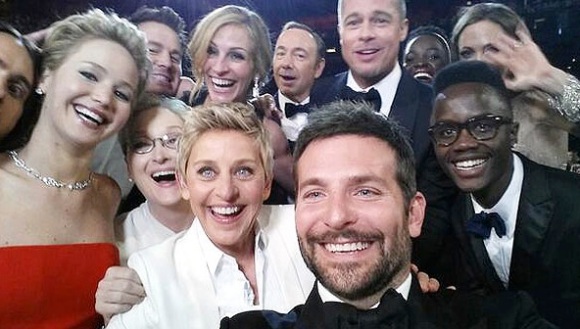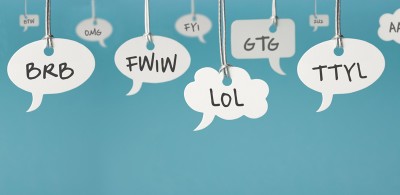Think back on the past year. Can you sum it all up in one word? Is there one word that captures the essence of 2013 for you? If it was a good year you probably had a lot of “buzzworthy” news to share. If it was an odd year, maybe it was because you just learned what “twerking” is. If it was an abbreviated year, maybe it’s when you found yourself using shortened words – not just on Twitter – srsly. It’s hard to capture a year in a word, but Oxford Dictionaries rises to the challenge annually when it selects it’s “Word of the Year.”
This year’s “Word of the Year” may have been banished by Lake Superior State University’s 39th annual List of Words to be Banished from the Queen’s English for Misuse, Overuse and General Uselessness, but it took the top spot for Oxford Dictionaries. You guessed it, the 2013 “Word of the Year” is “selfie.” Love it or hate it, you can’t deny that selfies were everywhere in 2013 and don’t seem to fading away anytime soon. “Selfie” is also among the new words added to the Oxford Dictionaries in 2013, making it in a word – legit.

Credit: Ellen Degeneres
What does it take to be named “Word of the Year” and be entered into the dictionary? Of all the words in our language how does one beat out the rest for the top spot? We find out today, as we continue our series on Words and Word Choice and speak with Allison Wright, an editor for Oxford Dictionaries. Allison shares with us the history of Oxford Dictionaries’ “Word of the Year,” the selection process, and some thoughts on why more non-traditional words such as acronyms and abbreviations are being added to the dictionary. We welcome her insight.
– – –
When did Oxford Dictionaries first start selecting a Word if the Year?
In 2004, the UK and US dictionary teams at Oxford University Press selected “chav” as the first Word of the Year. Since then, of the sixteen other words to hold the title over the years, only two were also joint UK/US selections – “squeezed middle” (2011) and “selfie” (2013).

President Obama takes a selfie with British Prime Minister David Cameron and Denmark’s Prime Minister Helle Thorning Schmidt.
(Credit: Getty Images)
What criteria are used to determine which word will be named Word of the Year?
The Oxford Dictionaries team keeps track of trends in, and new usages of, words and expressions throughout the year. Words of the Year must have attracted a great deal of interest and usually reflect the ethos of that year. They don’t have to be new words, but they do have to have become prominent or notable during that time. The selection committee, made up of editors, lexicographers, consultants, and members of Oxford University Press’s marketing and publicity teams, discusses the merits of each Word of the Year candidate, and after deliberation we come to a decision. Some years it’s easier to identify a clear frontrunner, while in others it’s a bit more challenging.
How many words were entered or considered? Is that a fairly typical amount from year to year?
There’s no limit to the number of words that are considered for Word of the Year. We add words to a long list throughout the year and determine which of them has shown staying power and which are more like flash-in-the-pan words that spiked in usage over a given month or so – typically due to extensive coverage in the news. Last year, “Harlem shake” and “fatberg” fell into the flash-in-the-pan category. Last year’s Word of the Year shortlist, which is culled down from the longer list, had 7 words: bedroom tax, binge-watch, bitcoin, olinguito, schmeat, showrooming, and twerk.
Oxford Dictionaries chose “Selfie” as their word of the year for 2013. Why was this word selected?
Our language research found that “selfie” showed overwhelmingly strong usage in 2013, much more so than in 2012. One of the computational tools we use to track evidence of real English usage is the New Monitor Corpus, a program that collects 150 million words each month from new web content. It revealed a frequency increase of 17,000% of the word from the previous year. We’ve also found “selfie” to be linguistically productive. Several new derivatives and spin-off words have developed and have been especially useful for describing different types of selfie, including the “melfie”, a selfie of one’s mustache, “drelfie,” a drunk selfie, “belfie,” a selfie of one’s butt, and “legsie,” a selfie of one’s legs.

Credit: Twitter user @MarsCuriosity
What type of reaction did you receive to “Selfie” being selected as Word of the Year?
The reaction to our Word of the Year announcement was largely positive, and as you can imagine, quite vocal. Thanks to social media, Twitter in particular, we were able to see reactions in real time. People tweeted us their own selfies, and we received a few specially notable ones – members of the Golden State Warriors NBA team sent in a few as did the Mars “Curiosity” Rover.
Different words are chosen as “Word of the Year” for different versions of Oxford Dictionaries. For example the 2012 Word of the Year for the United Kingdom version was “omnishambles” while it was “to GIF” for the American version. Why is it important to have different Words of the Year for the different versions of Oxford Dictionaries? What does this say about the cultures represented by the different versions of the dictionaries? Were Americans just more focused on advancements in social media and technology than the British in 2012?
Vocabularies and language use develop differently in each country, and in some years, our Word of the Year selections reflect that difference. Our editorial staff in the US and UK keeps track of happenings in the news and popular culture, and when we find diverging trends – the near ubiquity of a word or expression in one country that for whatever reason fails to catch on across the pond, for example – the selection committee decides against a joint Word of the Year.
In 2012, “omnishambles” was one of those words you couldn’t escape in the UK thanks to the popularity of its source of origin, the TV series The Thick of It, as well as the numerous political and non-political occurrences in the UK throughout that year that could so easily be classified as “a situation that has been comprehensively mismanaged.” Use of the word in the US, however, never really took off, and so the decision was made to announce different Words of the Year for the US and UK.
We’d also found the effects that the rise in popularity of GIF-making had on language to be an interesting phenomenon in 2012. The ease at which social media enabled people to display and share material created in the GIF format allowed for the spread in usage of different forms of the word, like the use of “gif” as a verb or as an adjective “gifable.” The selection of “to GIF” as the US Word of the Year is a mark of the efforts of Oxford Dictionaries to stay on top of the ways technological innovation and creativity influence our culture.
How often does Oxford Dictionaries add new words?
To keep up to date with the latest developments in the English language, we add new words and senses and revise entries in our online dictionaries several times a year. Oxforddictionaries.com, which focuses on current English and practical usage, will add thousands of new words each year. Oxford English Dictionary Online, which shows how words and meanings have changed over time, will also add a few thousand words in new entries and sub-entries each year.

Credit: Global Language Monitor
How are new words selected to be added to Oxford Dictionaries?
The most generalized answer would be to say that new words qualify for inclusion in our dictionaries when there is enough evidence of their use, however, the process is a bit more involved and inclusion criteria differs across dictionaries.
For words added to oxforddictionaries.com, lexicographers use a number of sources to gather evidence of a new coinage or usage. The Oxford English Corpus is used to analyze language found in writing all over the Web, and the Reading Program, which tasks people worldwide to read books, magazines, newspapers, scripts, and other printed material, collects new and interesting instances of words, phrases, and expressions for deeper investigation. Potential new words are also spotted in the wild, in general encounters with the English language in everyday life. Oxford Dictionaries editors and users frequently submit new word suggestions.
Once a suggested word is submitted for researching, lexicographers will assess it along a number of criteria, including whether usage is limited to a specific group of people (like teenagers or a sub-group of commenters on an online community forum) or if it is found in a variety of different sources and used by many different writers; whether it has any staying power in English usage; whether it shows linguistic productivity (e.g. if it has any derivative forms) or broader use outside of its most immediate context; and any other relevant factors.
If the word is selected for inclusion, it will be assigned for further research and definition drafting; if not, it may continue to be monitored for future inclusion if more supporting evidence emerges.

Credit: Career Options Magazine
“Srsly,” “apols,” and “FIL (Father-in-Law),” were among some of the new words added to Oxford Dictionaries last year. Are you seeing a trend of more abbreviations and acronyms being included as words? What do you attribute this to?
Acronyms and abbreviations certainly have their value when space constraints (such as Twitter character limits) are a concern. If they are used and understood widely enough, it’s even possible that they cease to be seen as shortened forms of longer words altogether. See: scuba, blog, and CD.
It may seem like a more recent trend, but really people have always had an affinity for shortenings, contractions, abbreviations, and acronyms. We’ve found evidence for “srsly” being used as early as the 18th century, “and “OMG” has been in use since at least 1917. It’s the job of lexicographers to accurately and comprehensively record these kinds of constructions regardless of any perceived “merits.”
Oxford Dictionaries also offers a Word of the Day on its website. How are these words chosen and what is goal of this feature?
The Oxford Dictionaries Word of the Day is a word that typically has a particularly interesting meaning. The words are selected by editorial and marketing staff and then loaded onto the website and prepared for the email newsletter with the help of Oxford University Press’ tech teams. Sometimes words will be assigned to a specific day if it’s appropriate. For example, scriptorium was chosen for February 7th this year because that was also James Murray’s birthday anniversary. Murray, the first editor of the Oxford English Dictionary, famously worked in a scriptorium.
The goal of the feature is to offer our audiences another look into the breadth of our language. Many people use dictionaries just to find definitions for known words; the Word of the Day invites them to explore vocabulary that may be unfamiliar or underused.

Credit: Bubblews L.L.C.
What was your favorite new word added to Oxford Dictionaries in 2013?
My favorite “new word” added to oxforddictionaries.com in 2013 is me time, an informal noun defined as “time spent relaxing on one’s own as opposed to working or doing things for others, seen as an opportunity to reduce stress or restore energy.”
I think everyone, everywhere, can make good use of “me time”— in communication and in practice.
Any guess as to what words may be added during the next update?
I have an idea of what will be added in the next update, but I’d hate to ruin the surprise! Follow us @OxfordWords to stay tuned.
– – –
What was your favorite word in 2013? Share some with us or send us a selfie.
Liz Faris, Account Manager
Collaborative Services, Inc.

Recent Comments